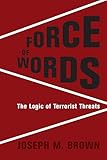Force of Words : The Logic of Terrorist Threats / Joseph M. Brown.
Material type: TextSeries: Columbia Studies in Terrorism and Irregular WarfarePublisher: New York, NY : Columbia University Press, [2020]Copyright date: ©2019Description: 1 online resourceContent type:
TextSeries: Columbia Studies in Terrorism and Irregular WarfarePublisher: New York, NY : Columbia University Press, [2020]Copyright date: ©2019Description: 1 online resourceContent type: - 9780231550451
- 363.325 23
- HV6431 .B776 2020
- online - DeGruyter
| Item type | Current library | Call number | URL | Status | Notes | Barcode | |
|---|---|---|---|---|---|---|---|
 eBook
eBook
|
Biblioteca "Angelicum" Pont. Univ. S.Tommaso d'Aquino Nuvola online | online - DeGruyter (Browse shelf(Opens below)) | Online access | Not for loan (Accesso limitato) | Accesso per gli utenti autorizzati / Access for authorized users | (dgr)9780231550451 |
Frontmatter -- Contents -- Acknowledgments -- Introduction -- 1. Threats: A Theoretical Framework -- 2. The Provisional IRA: A Full Spectrum of Threats -- 3. ETA and the Tamil Tigers: Comparable Threats for Social Control and Negotiation; Contrasting Threats for Legitimacy, Disruption, and Advantage -- 4. The MRTA and the Shining Path: Common Enemy; Virtually No Threat in Common -- 5. The Taliban, ISIL, and Boko Haram: Comparable Threats for Social Control; Contrasting Threats for Legitimacy, Negotiation, Aggrandizement, and Advantage -- 6. Quantitative Analysis: When to Expect Truthful Warnings -- Conclusion -- Appendix -- Notes -- Bibliography -- Index
restricted access online access with authorization star
http://purl.org/coar/access_right/c_16ec
Terrorist groups achieve notoriety through acts of violence, but often threats of potential or upcoming violence are just as effective. Threats disrupt economies and ensnare security forces; they frighten civilians and encourage supporters; and they build credibility and force opponents to make concessions. Force of Words is a groundbreaking examination of the role of threats in terrorist strategies that explains the broader purpose and meaning of terrorist propaganda.Joseph M. Brown explains how terrorist groups tailor their threats so that the desired political message is sent. He scrutinizes why terrorists issue warnings of imminent attacks and pledges of violence as well as their use of hoaxes and bluffing. Drawing on rich interview data, quantitative evidence, and case studies of the Irish Republican Army, ETA, the Tamil Tigers, Shining Path, the Túpac Amaru Revolutionary Movement, Boko Haram, the Afghan Taliban, and ISIL, Brown explores the ways that terrorists use language. He demonstrates that when terrorists rely on civilian support, fight democracies, seek social control, or demand negotiations, their threats should be taken seriously. By identifying the conditions that incentivize particular types of threats, Brown offers practical guidance for interpreting and assessing terrorists’ statements. A bold and rigorous consideration of terrorism’s tactical and strategic logic, Force of Words sheds new light on the symbolic, psychological dimension that makes this form of political violence distinctive.
Mode of access: Internet via World Wide Web.
In English.
Description based on online resource; title from PDF title page (publisher's Web site, viewed 02. Mrz 2022)


